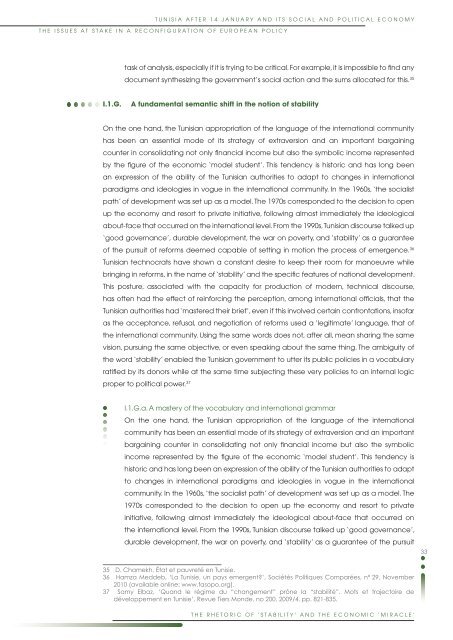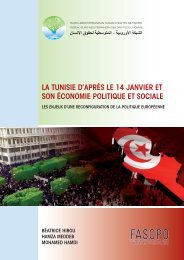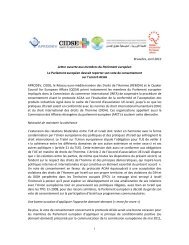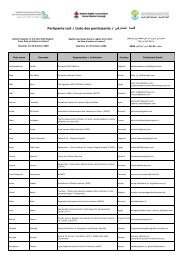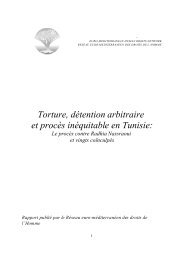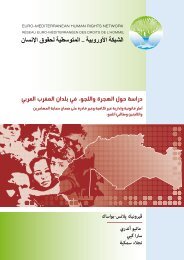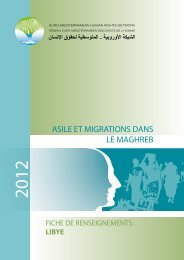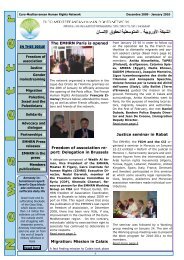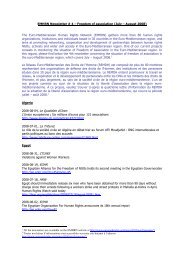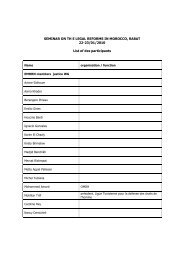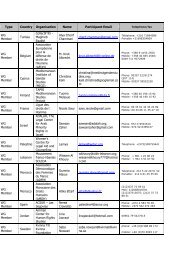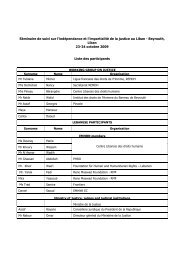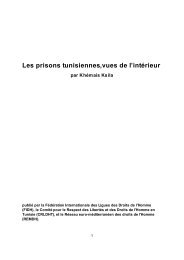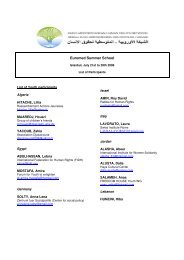tunisia after 14 january and its social and political economy - Refworld
tunisia after 14 january and its social and political economy - Refworld
tunisia after 14 january and its social and political economy - Refworld
Create successful ePaper yourself
Turn your PDF publications into a flip-book with our unique Google optimized e-Paper software.
T U N I S I A A F T E R 1 4 J A N U A R Y A N D I T S S O C I A L A N D P O L I T I C A L E C O N O M YT H E I S S U E S A T S T A K E I N A R E C O N F I G U R A T I O N O F E U R O P E A N P O L I C Ytask of analysis, especially if it is trying to be critical. For example, it is impossible to find anydocument synthesizing the government’s <strong>social</strong> action <strong>and</strong> the sums allocated for this. 35I.1.G.A fundamental semantic shift in the notion of stabilityOn the one h<strong>and</strong>, the Tunisian appropriation of the language of the international communityhas been an essential mode of <strong>its</strong> strategy of extraversion <strong>and</strong> an important bargainingcounter in consolidating not only financial income but also the symbolic income representedby the figure of the economic ‘model student’. This tendency is historic <strong>and</strong> has long beenan expression of the ability of the Tunisian authorities to adapt to changes in internationalparadigms <strong>and</strong> ideologies in vogue in the international community. In the 1960s, ‘the <strong>social</strong>istpath’ of development was set up as a model. The 1970s corresponded to the decision to openup the <strong>economy</strong> <strong>and</strong> resort to private initiative, following almost immediately the ideologicalabout-face that occurred on the international level. From the 1990s, Tunisian discourse talked up‘good governance’, durable development, the war on poverty, <strong>and</strong> ‘stability’ as a guaranteeof the pursuit of reforms deemed capable of setting in motion the process of emergence. 36Tunisian technocrats have shown a constant desire to keep their room for manoeuvre whilebringing in reforms, in the name of ‘stability’ <strong>and</strong> the specific features of national development.This posture, associated with the capacity for production of modern, technical discourse,has often had the effect of reinforcing the perception, among international officials, that theTunisian authorities had ‘mastered their brief’, even if this involved certain confrontations, insofaras the acceptance, refusal, <strong>and</strong> negotiation of reforms used a ‘legitimate’ language, that ofthe international community. Using the same words does not, <strong>after</strong> all, mean sharing the samevision, pursuing the same objective, or even speaking about the same thing. The ambiguity ofthe word ‘stability’ enabled the Tunisian government to utter <strong>its</strong> public policies in a vocabularyratified by <strong>its</strong> donors while at the same time subjecting these very policies to an internal logicproper to <strong>political</strong> power. 37I.1.G.a. A mastery of the vocabulary <strong>and</strong> international grammarOn the one h<strong>and</strong>, the Tunisian appropriation of the language of the internationalcommunity has been an essential mode of <strong>its</strong> strategy of extraversion <strong>and</strong> an importantbargaining counter in consolidating not only financial income but also the symbolicincome represented by the figure of the economic ‘model student’. This tendency ishistoric <strong>and</strong> has long been an expression of the ability of the Tunisian authorities to adaptto changes in international paradigms <strong>and</strong> ideologies in vogue in the internationalcommunity. In the 1960s, ‘the <strong>social</strong>ist path’ of development was set up as a model. The1970s corresponded to the decision to open up the <strong>economy</strong> <strong>and</strong> resort to privateinitiative, following almost immediately the ideological about-face that occurred onthe international level. From the 1990s, Tunisian discourse talked up ‘good governance’,durable development, the war on poverty, <strong>and</strong> ‘stability’ as a guarantee of the pursuit3335 D. Chamekh, État et pauvreté en Tunisie.36 Hamza Meddeb, ‘La Tunisie, un pays emergent?’, Sociétés Politiques Comparées, n° 29, November2010 (available online: www.fasopo.org).37 Samy Elbaz, ‘Qu<strong>and</strong> le régime du “changement” prône la “stabilité”. Mots et trajectoire dedéveloppement en Tunisie’, Revue Tiers Monde, no 200, 2009/4, pp. 821-835.T h e r h e t o r i c o f ‘ s t a b i l i t y ’ a n d t h e e c o n o m i c ‘ m i r a c l e ’


